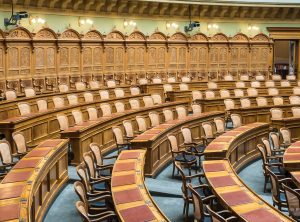Parliamentary Engagement in OGP: Learning from the Evidence

Credit: Hansjörg Keller via Unsplash
Executive Summary
This paper aims to inform the Legislative Engagement Policy review and serves as background for consultations with parliaments and partners. It draws on data from the Open Government PartnershipThe Open Government Partnership (OGP) is a multi-stakeholder initiative focused on improving government transparency, ensuring opportunities for citizen participation in public matters, and strengthen... More (OGP) commitments database, reports from the Independent Reporting Mechanism (IRM)The Independent Reporting Mechanism (IRM) is OGP’s accountability arm and the main means of tracking progress in participating countries. The IRM provides independent, evidence-based, and objective ..., findings from the OGP Support UnitThe OGP Support Unit is a small, permanent group of staff that work closely with the Steering Committee and the Independent Reporting Mechanism to advance the goals of the Open Government Partnership...., and insights collected through a range of formal and informal conversations with OGP stakeholders since 2011.
Part I reviews the substance of engagement, demonstrating significant variation in both quality and quantity:
- Parliaments are increasingly acting as implementers of reform by taking legislative action in support of open government reforms. Since 2011, parliaments have supported the implementation of OGP commitments and open government reforms. This important trend can be accelerated with improved guidance on the engagement of parliaments in the national OGP process for all stakeholders – parliaments, governments, and civil society.
- Despite their evident importance, OGP commitments related to oversight and accountability functions lag behind. Effective parliamentary oversight of the executive branch is key to the integrity of democratic systems and, by extension, to the open government agenda. However, parliamentary oversight, in OGP, is an area for growth. Moving forward, more commitments could address this.
- More ambitionAccording to OGP’s Articles of Governance, OGP commitments should “stretch government practice beyond its current baseline with respect to key areas of open government.” Ambition captures the po... and credible implementation would further strengthen efforts to open up parliaments. A growing number of open parliamentEnsuring access to legislative information and creating mechanisms for public participation are critical to building an open, trusting relationship with citizens. Technical specifications: Commitments... More champions are working with civil society advocates to make legislative institutions more transparent, accountable, and inclusive. Stronger co-creation and improved implementation would deepen the impact of these commitments.
Advancing open government through legislative action, oversight, or by opening up parliamentary processes and institutions requires spaces for collaboration and dialogue. The 2017 Legislative Engagement Policy outlines opportunities for parliamentary engagement in OGP, and allows parliaments to co-create and implement open parliament plans as chapters of national action plans. Part II reviews these engagement processes, resulting in two key findings.
First, as OGP data shows, ambition often comes from effective engagement and co-creation. Good communication – and collaboration where possible – between government, parliament, and civil society is essential for parliaments to support and contribute to OGP commitments and open government reforms. OGP will develop improved guidance for all stakeholders to work towards shared goals throughout the OGP process, with respect for the separation of powers.
Second, in a number of cases, the integration of open parliament plans in OGP action plans – requiring parliaments to work on the same two-year timeline as their executives – undermines their potential. Such an ‘integrated’ OGP action planAction plans are at the core of a government’s participation in OGP. They are the product of a co-creation process in which government and civil society jointly develop commitments to open governmen... remains the preferred option, but is not feasible across all contexts or systems of government. In reviewing the policy, OGP will consider how rules can be modified to allow a greater focus on substance going forward.
OGP has seen substantial traction of parliaments as implementers of OGP commitments and reforms as well as in the co-creation and implementation of open parliament commitments and plans. As OGP steps into its second decade, parliaments will remain instrumental in delivering on open government ambitions. The revised parliament policy will enable all members of the OGP community to explore this to the fullest.

Leave a Reply